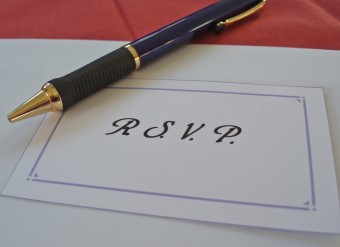What R.S.V.P. Stands For
 Today I found out what R.S.V.P. stands for, namely Répondez S’il Vous Plaît, which translates roughly as “please reply” or “reply if it pleases you”.
Today I found out what R.S.V.P. stands for, namely Répondez S’il Vous Plaît, which translates roughly as “please reply” or “reply if it pleases you”.
So how did R.S.V.P. make its way into being used for wedding invitations and the like? This dates all the way back to around the 11th century when French became the fashion among the elite of the English court. This continued in England for several hundred years. It was also the fashion in the United States, among high society, to use French as the language of refinement up until around the 19th century. From this, many such similarly themed French phrases and words made their way into English, another example being the word “etiquette” itself.
Ironically, the French themselves don’t usually use R.S.V.P. anymore, more typically using Prière de Répondre these days.
Bonus Facts:
- A new trend sweeping the invitation world is to not ask for an R.S.V.P., but rather put a “Regrets Only”, so the inviter will expect you unless you respond checking the “Regrets Only” box. If you don’t respond, they assume you are coming.
- The choice to use periods following the letters in “R.S.V.P.” is somewhat a personal preference today, despite it being an abbreviation. Many guides say periods are necessary because it is an abbreviation, such as AP; others say you should not use them; and still others say it is personal preference. To further cloud the issue, some, like the Chicago Manual of Style, recommend only using periods if the letters are printed in all lower case, otherwise no periods.
- Etiquette first showed up in English around the 18th century. It derives from the Old French: estiquette, meaning something to the effect of “label or ticket”. Estiquette in turn derives from the Old French: estechier, meaning “to attach or stick”. It is thought that the word “etiquette” came about thanks to King Louis XIV (Louis the Great) who had étiquettes passed out at his palace at Versailles. These étiquettes were basically just little cards that had various reminders written on them like “Ne marchez pas sur l’herbe” (keep off the grass) and other such rules of conduct at the palace.
- The famed “Let them eat cake” saying often falsely attributed to Marie Antoinette, was actually referencing something the wife of Louis XIV, Maria-Thérèse, said, around 100 years before Marie Antoinette was born. The actual saying “let them eat cake” (Qu’ils mangent de la brioche) was first documented some time later by the political philosopher Jean-Jacques Rousseau in his autobiography “Confessions”. At the time, Marie Antoinette was only 10 years old and living in Austria. In this autobiography, he was referencing a “great princess” who, when told the peasants had no bread, said “Well, let them eat brioche.” (brioche being a highly enriched bread). To read more on this and about the very sad story that was Marie Antoinette’s life. Go here: Marie Antoinette Never Said “Let Them Eat Cake”
- Louis XIV had a reputation for being an extremely stinky person. As one Russian ambassador to France noted “His Majesty [Louis XIV] stunk like a wild animal.” King Louis XIV stench came from the fact that his physicians advised him to bathe as infrequently as possible to maintain good health. He also stated he found the the act of bathing disturbing. Because of this, he is said to have only bathed twice in his lifetime. If you’re interested in finding out why bathing became so unpopular in parts of medieval Europe, check this article out: Why Bathing was uncommon in Medieval Europe
- Another in this “gruesome two-some” class among the aristocracy was Queen Isabel I of Spain who once confessed that she had taken a bath only twice in her lifetime, when she was first born and when she got married.
| Share the Knowledge! |
|





Gee, I always thought it meant “Remember Send Vedding Present.”
I read a joke in Boy’s Life that said it meant “Rush In. Shake Hands. Vanish Promptly.” And that’s what I stuck with for the last 25 years.
i heard a boy say it means Rice n Stew Very Plenty………
all this time i thought it means Reserve Seat Via Phone……
I’ve thought it to mean rice n stew very plenty.